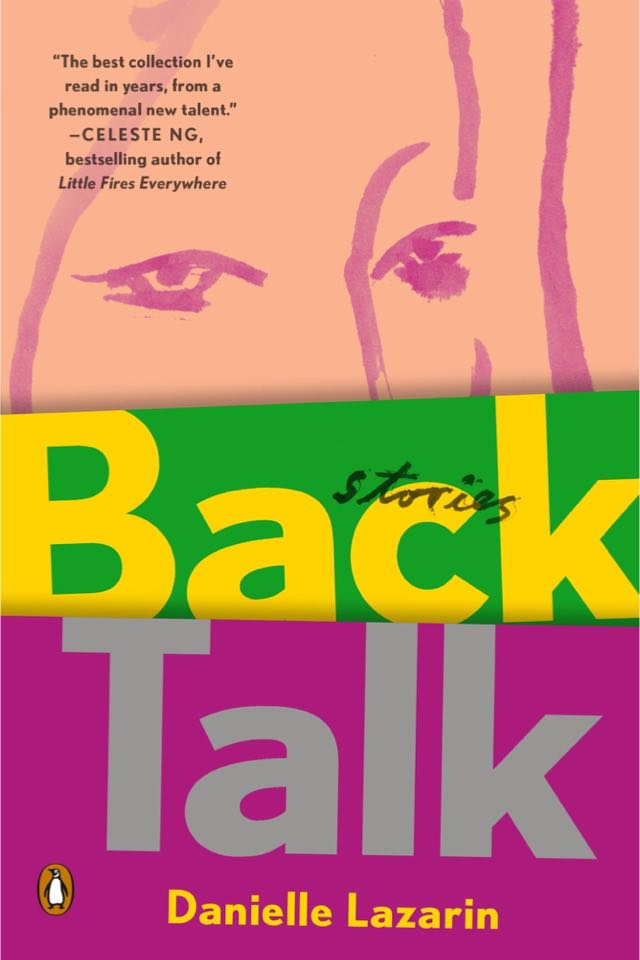Back Talk
— Ariel Saramandi
In the past two years, we’ve been treated to fiction that brilliantly explores the hidden recesses of women’s minds, unarticulated sentiments, desires. Such fiction often works through the use of affect, metaphor, the surreal: I’m thinking of Carmen Maria Machado’s Her Body and Other Parties, and Sophie Mackintosh’s The Water Cure. In both texts, the surreal (and the mythical) exacerbate the experience of pain and desire as read on the page. In doing so, the reader feels, exactly, the true depths of such emotions—the stomach-clutching, lung-wheezing intensity of them. Feeling informed by knowledge of these experiences: in Machado’s story ‘The Husband Stitch’ for instance, we feel, we know the way men ask for more and more and forever more of us in a relationship, so much that our metaphorical head unravels.

Danielle Lazarin’s stories in Back Talk are all firmly anchored within our times. No magical realism or dystopia, just the magic of precisely uttering feeling into language. Lazarin’s talent is uncanny. Her prose is fluid, accessible, in the first person: it ‘clicks’ (to use David Foster Wallace’s term for good writing), gains momentum as it sweeps you along into uncomfortable places you’ve travelled to before (but of course, would rather not think about), to places you know but couldn’t quite describe. It’s a collection where you’re constantly saying to yourself yes, that’s it, that’s exactly it. It’s how it felt. It’s what I felt. There are no manic pixie dream girls here, none of the feminine stereotypes often found in (male-dominant) literature: Lazarin’s women are quiet and they desire, they feel power, fury. That ‘and’ has been sorely lacking in the literature we publish and revere for far too long. Her women are real, they are preoccupied by love and loss and relationships, they are (shock! horror!) domestic. How marvellous.
The scope of emotion explored in these sixteen stories makes them impossible to summarise. Such is their overwhelming force and reach: a paragraph could stand alone beyond the story’s plot, and it would be enough. Plot, in fact, seems to be just the passage of time: moments are lived, and then reflected upon. Take ‘Appetite’, the first story: a publishing collateral tells me this is a sixteen-year-old grieving her mother’s death experiences first love and questions how much more heartbreak she and her family can endure.
That phrase cannot possibly capture the many aches of those 26 or so pages, the way the hurt and grief of each relationship informs all the others. The girl in question is in mourning; her mother has died from cancer, her sister and her father attempt to turgidly move on. She falls for George, a macho teenage boy with all the trappings: protective, overconfident, selfish. She is conscious of this, the way he is: there’s power in her, in his wanting her, and she knows it. She wonders how much she’ll take, what it would mean for her to take from him, complicit in his misogyny. He won’t ask me what I want but he will give me what I need […] I like letting him handle it, every time he tells me something is okay even when it’s not.
She wonders what kind of attitude would keep her safe from being destroyed by death again. She decides to lay claim to George for a little while, and then I let him go because I think it’s good practice for the rest of my life, because I think the longer you love someone the more it hurts, the more you have to imagine them in places they’ll never be again.
I don’t even have the space to explore how her feelings for George are also linked to her father, who sleeps with another woman to cope with his pain, and to her sister, who cooks expensive meals as therapeutical distraction. You’ll have to discover that, and all the stories, for yourself.